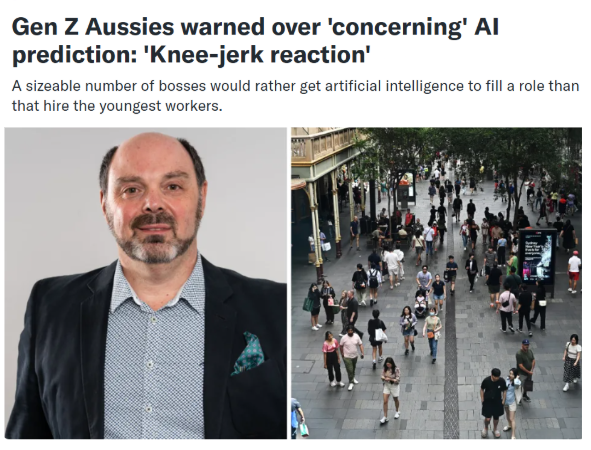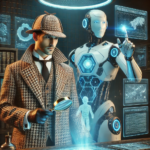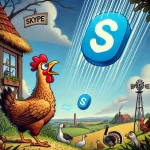AI vs. Gen Z: A False Choice?
The AI Hiring Hype – Are We Jumping the Gun?
It’s happening again.
A new technology emerges, fear spreads, and suddenly, an entire generation is told they’re unprepared, obsolete, or about to be wiped out of the workforce.
This time, the narrative is that AI will replace Gen Z workers before they’ve even had a chance to gain experience.
Some employers are already considering hiring AI over entry-level employees, believing it will cut costs and boost efficiency.
I was recently quoted in a Yahoo News article on this very topic (read it here).
And let me be clear: this reaction is short-sighted, uninformed, and ultimately self-defeating.
Here’s why.
The Knee-Jerk Reaction to AI
I’ve seen this pattern before.
Every time a new technology disrupts an industry, there’s an immediate assumption that entire jobs or even generations will disappear overnight.
In the Yahoo News piece, I said:
“It concerns me because it shows that, firstly, employers don’t really understand artificial intelligence, what it can do, or what it might be able to do. It’s a knee-jerk reaction, and it also doesn’t speak well to what Gen Z’s are going to be, because in 2035, they will make up 20 per cent of the working population.”
Employers don’t fully understand AI, yet some are already making rash decisions about its role in hiring.
They see automation and efficiency and assume human workers, especially young and inexperienced ones, are suddenly redundant.
That’s not how innovation works.
Yes, AI is changing the nature of work. Yes, it will automate tasks.
But tasks are not jobs, and jobs are not industries.
We need a smarter, more nuanced conversation.
AI Will Automate Tasks – Not Replace People
There’s no denying that AI can automate repetitive or technical tasks.
Entry-level roles in areas like data analysis, customer service, and administration are already shifting.
But replacing an entire workforce with AI?
That’s ridiculous.
As I mentioned in the article:
“There are so many things that humans can do that technology and artificial intelligence won’t do for a long time, if ever.”
What are those things?
The Unique Human Edge
- Creativity – AI can generate content, but it can’t truly innovate, think laterally, or create new ideas from lived experiences.
- Emotional Intelligence – AI can simulate empathy but can’t genuinely understand human emotions or make complex social decisions.
- Critical Thinking & Problem Solving – AI follows data patterns, but human intuition, experience, and ethical reasoning still drive big decisions.
- Collaboration & Leadership – AI doesn’t inspire teams, negotiate deals, or build relationships that create business success.
Gen Z isn’t becoming obsolete—they’re adapting.
And smart businesses will recognise that hiring AI isn’t a substitute for investing in young talent.
Every Generation Faces the Same Struggle
This panic over AI replacing Gen Z is just history repeating itself.
Every generation entering the workforce has faced scepticism from their older counterparts:
- Boomers were told they lacked work ethic compared to their WWII-era parents.
- Gen X was called ‘lazy’ for valuing work-life balance.
- Millennials were mocked for their reliance on technology and ‘job-hopping’.
And now?
Gen Z is being told AI will make them irrelevant.
It’s nonsense.
The whole point of education, training, and early careers is to build real-world skills.
Every generation learns, adapts, and evolves.
Gen Z is no different.
What Should Employers Be Doing Instead?
So, what’s the alternative?
Instead of making knee-jerk AI hiring decisions, smart leaders will do this instead:
 1. Upskill & Train Young Employees
1. Upskill & Train Young Employees
Instead of replacing entry-level talent, invest in them.
Teach them how to use AI, not compete against it.
- Offer AI literacy programs for all employees.
- Focus on human-AI collaboration, not replacement.
- Encourage continuous learning and adaptability.
 2. Redesign Jobs, Not Eliminate Them
2. Redesign Jobs, Not Eliminate Them
AI can take over some tasks, which frees up human workers to focus on high-value, creative, and strategic work.
- Use AI to handle data-heavy or repetitive processes.
- Shift human roles towards problem-solving, client relations, and innovation.
 3. Build AI-Human Hybrid Teams
3. Build AI-Human Hybrid Teams
AI doesn’t work in isolation.
The best workplaces will create AI-augmented teams where humans and AI work together.
- AI for data processing, automation, and support.
- Humans for strategy, ethics, leadership, and decision-making.
 4. Stop Treating AI as a Quick-Fix Solution
4. Stop Treating AI as a Quick-Fix Solution
Hiring AI instead of junior employees might seem like an easy way to cut costs. In reality, it’s a race to the bottom.
- AI lacks intuition, ethical judgment, and adaptability.
- Businesses need fresh human talent to grow and innovate.
The Real Future of Work: AI & Humans Together
The future isn’t AI vs. Gen Z—it’s AI + Gen Z.
Technology isn’t here to replace people.
It’s here to augment them, freeing up time for more meaningful, creative, and high-value work.
Gen Z isn’t doomed.
They’re learning, evolving, and shaping the future—just like every generation before them.
So, here’s my challenge: Are we mistaking automation for innovation?
Instead of writing off young workers, let’s ask:
- How can we use AI to enhance human skills, not replace them?
- What new jobs and roles can emerge from this AI-driven shift?
- Are we training Gen Z for the future, or setting them up to fail?
Let’s stop the fear-mongering and start building a workforce that blends human talent with AI in a way that benefits everyone.
Final Thoughts
AI is not the enemy of young workers.
But bad business decisions based on misunderstanding AI’s capabilities could be.
Instead of replacing Gen Z, smart employers will empower them with AI skills, redesign jobs to leverage human strengths, and create hybrid teams that balance technology with real human ingenuity.
Want to dive deeper?
Read the full article on Yahoo News here: Yahoo News
Or, if you’re a leader navigating AI-driven changes, let’s talk about how to build a future-proof workforce.
#AI #FutureOfWork #GenZ #ArtificialIntelligence #HiringTrends #Automation #AIRecruitment #WorkforceStrategy #BusinessInnovation #FutureJobs #Technology #Leadership #CorporateStrategy #AIandJobs #HumanMachineCollaboration #MorrisMisel #AIWorkplace



